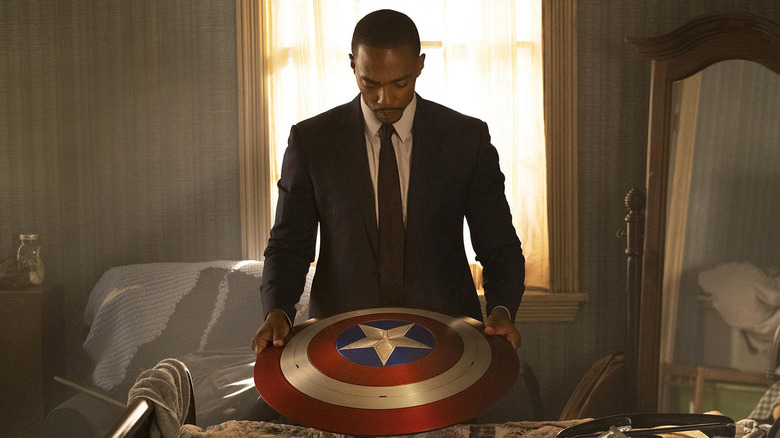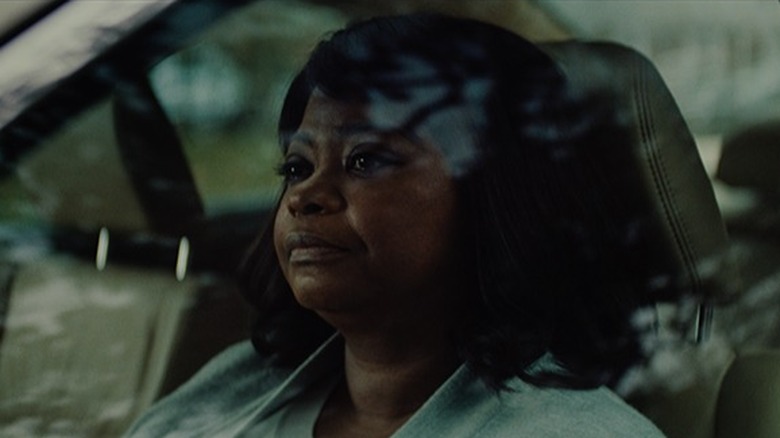Captain America: Brave New World's Octavia Spencer Tribute Explained
"Captain America: Brave New World" doesn't just stick a sequel tease in its end credits, it also includes a "special thanks" to a beloved actor. Is it star Anthony Mackie, or the "Brave New World" MVP Harrison Ford? Nope, it's someone who doesn't even star in the film. Any guesses?
It's Octavia Spencer, who starred in "Captain America 4" director Julius Onah's previous film "Luce." Speaking to People magazine, Onah revealed why he thanked Spencer alongside his actual family and the Stan Lee Foundation. According to Onah, he may not have directed the movie if she hadn't helped him out. He explained:
"Octavia's the greatest. I'm such a fan of hers, and when the conversation was being had about this film, she put in some kind words for me with Kevin Feige and had spoken to [Anthony] Mackie as well. She's just a genuinely kind, incredibly talented human being, and I wanted to really acknowledge what a great supporter she's been of me and other filmmakers in the past. There was no way I was gonna miss the opportunity to say thank you to her."
"Brave New World" has not gotten the best reviews, nor did his last genre film "The Cloverfield Paradox." Onah's work on "Luce," by far his best film, proves his talent may be best served by smaller but more meaningful, actor-driven films.
Octavia Spencer previously played a key role in Julius Onah's Luce
Octavia Spencer has been acting professionally since the 1990s, but she became a household name in 2012 after her Oscar-winning performance in 2011's "The Help." That film, following Black women working as maids in 1960s Mississippi, has earned criticism (even from its own star Bryce Dallas Howard) for falling short of its supposed progressivism. How fitting that Spencer later starred in "Luce" which critiques the limits of white saviors as liberators.
"Luce" is named for its lead character (Kelvin Harrison Jr., in one of the 10 films he starred in between 2018 and 2019). Luce is a former child soldier from Eritrea who was adopted by Amy and Peter Edgar (Naomi Watts and Tim Roth) — now, he's a star athlete and student with a bright future. Until his teacher Harriet Wilson (Spencer) reads an essay from Luce and comes away disturbed. In his writing, Luce praises the Afro-Caribbean revolutionary Frantz Fanon and his arguments that sometimes, violence is needed for social change.
Harriet frames her concern to the Edgars that Luce is still traumatized, and not totally deprogrammed, from his childhood spent at war. But when Luce and Harriet begin a cat-and-mouse game, it becomes clear she's trying to coach him in what is acceptable for a "model minority" to say before they lose that standing.
After all, Luce is so accepted by white society he's literally part of the family. Harrison even resembles every white liberal's favorite Black man, former President Barack Obama, and I'm sure that was no accident of casting. But praising Black revolutionaries, who fought for systematic change that would destroy racial hierarchies? That's a no-no, too scary even for the well-intentioned white people like the Edgars. Onah and Spencer's work on "Luce" puts it far ahead of how "Brave New World" explores the experience of being Black in America.
"Captain America: Brave New World" is currently playing in theaters.

